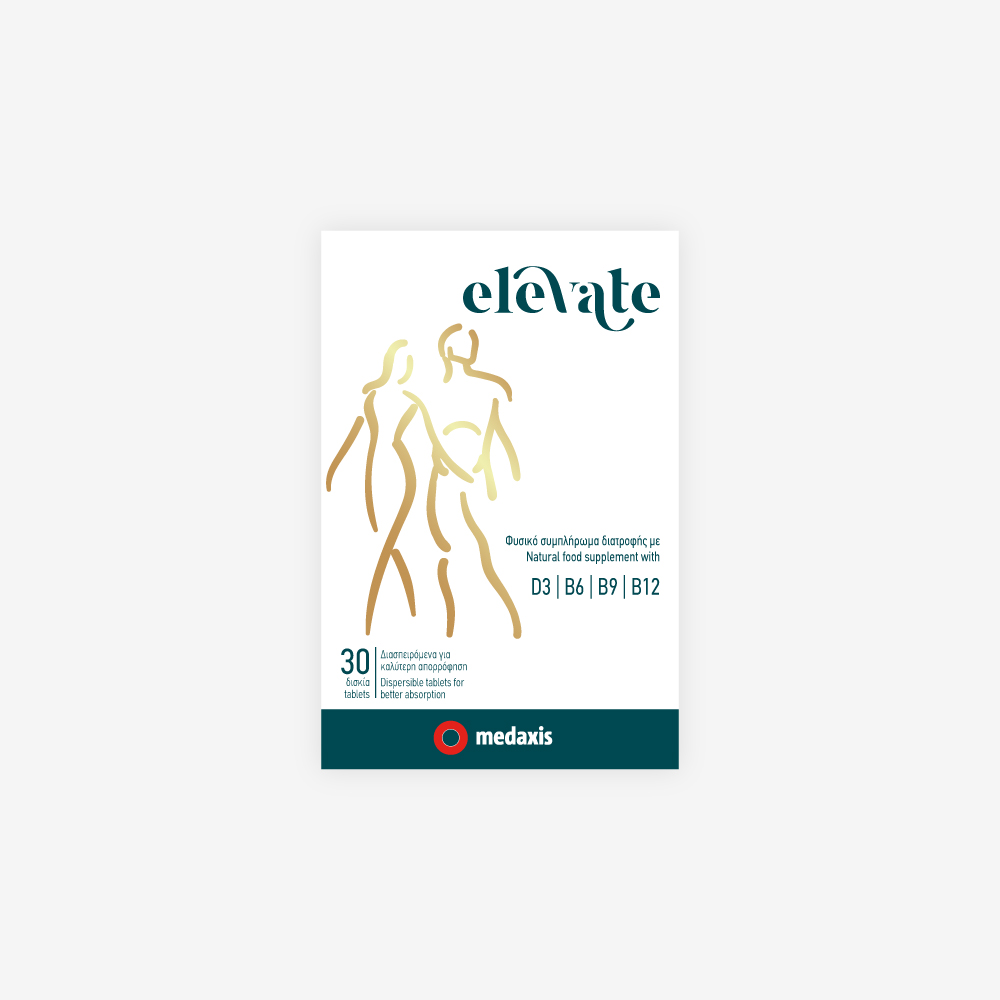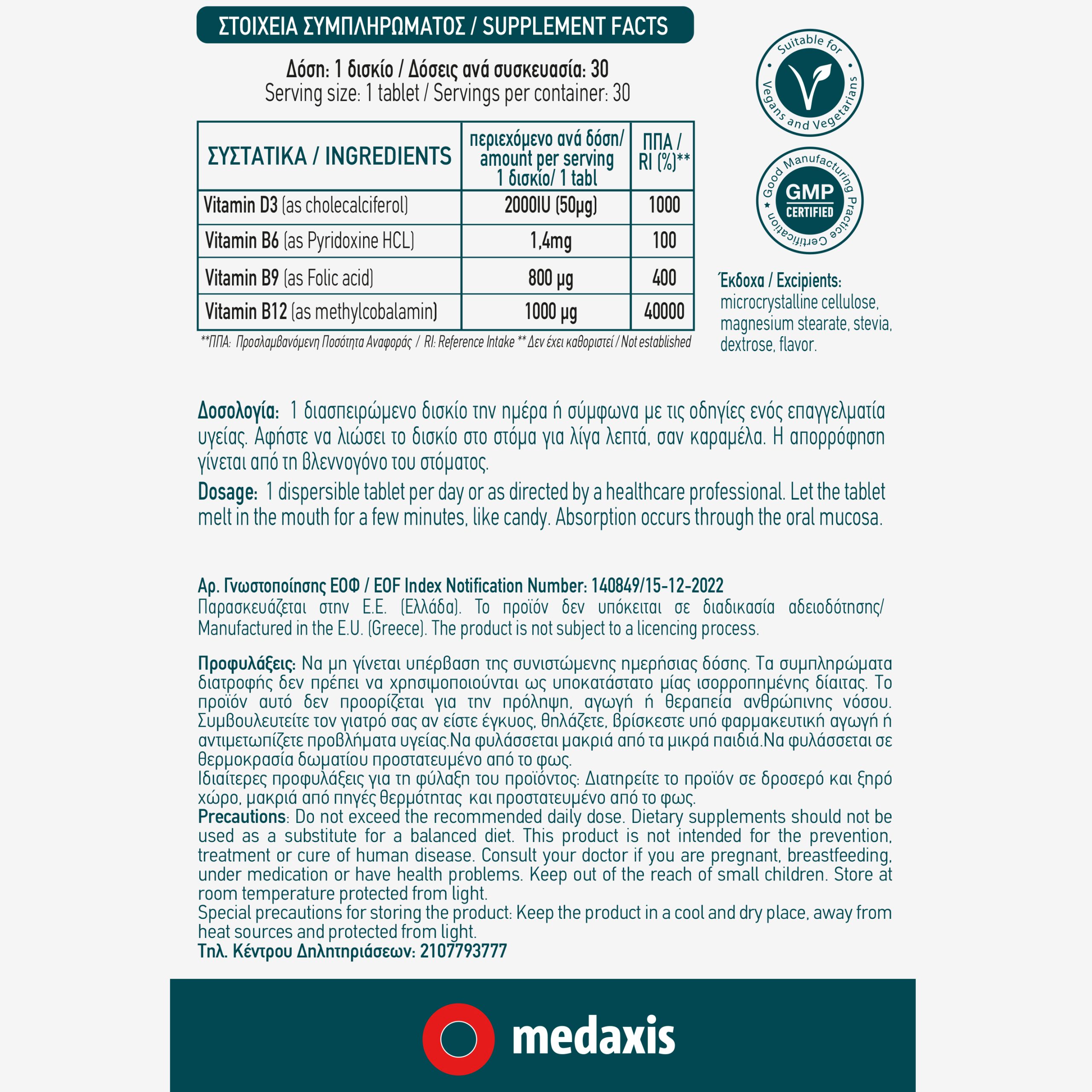Elevate
Introduction
Studies have revealed a clear link between nutrition and fertility, indicating that couples trying to conceive should pay particular attention to vitamin B9 (folic acid), vitamin B12, vitamin B6 and vitamin D3.
How can vitamin B6 boost fertility?
- Balances Estrogen and Progesterone
Vitamin B6 plays a key role in maintaining hormone balance. Adequate levels of vitamin B6 can balance estrogen and progesterone, which are the two key factors in reproduction.
- Increases cervical mucus
Cervical mucus is extremely important as it helps in the easy transfer of the sperm to the egg. In addition, it nourishes and protects the egg and sperm. Vitamin B6 helps create cervical mucus.
- Strengthens the Luteal Phase
Vitamin B6 is known to enhance the luteal phase. This means it makes the uterus more receptive to pregnancy factors. Adequate amounts of vitamin B6 in the body can create hormones that make the lining of the uterus stronger and increase progesterone levels, thus increasing your chances of conception.
- Restores libido
Vitamin B6 can also increase or restore libido or sex drive. This is due to the increase in the hormone progesterone.
Vitamin B6 and sperm
Studies have shown that vitamin B6 levels affect sperm quality and other sperm parameters. Studies have also shown that vitamin B6 deficiency can alter the function of the gonads, as vitamin B6 is involved in the synthesis of testosterone.
B9
Folic acid and male fertility
Before we have an embryo, we need an egg and a sperm. While women are born with all the eggs they will ever have, a man’s body creates sperm on a daily basis. In fact, 1,500 new sperm are created every second. The process from germ cell to sperm takes about 60 days. Folic acid is an essential nutrient when it comes to cell division and DNA synthesis.
Folic acid levels measured in semen have been correlated with sperm count and health. One study found that low sperm folate levels were associated with poor sperm DNA stability.
Folic acid can additionally help with erectile dysfunction and can boost sperm count. Studies have shown that folic acid supplementation improves sperm parameters.
Folic acid and female fertility
Women who do not get enough folic acid in their diet are at greater risk of having a baby with neural tube defects (NTDs). When we consider how a baby starts – a single cell that divides and divides – it makes sense that folic acid could help ensure cell division and therefore proper fetal development. Neural tube defects include spina bifida, anencephaly, and encephalocele. Neural tube defects (NTDs) occur in 1.4 to 2 per 1,000 pregnancies and are second only to cardiac defects as the most common congenital malformations worldwide. At best, these birth defects can lead to lifelong disability and at worst, they can lead to premature death.
Folic acid supplementation that begins before conception and continues into early pregnancy has been found to reduce the occurrence of these birth defects by up to 60%.
Other potential benefits of folic acid supplementation include:
- Lower risk of congenital heart defects
- Lower risk of premature birth and lower risk of low birth weight babies
- Increased progesterone levels and lower risk of irregular ovulation
Couples trying to conceive should make sure they get enough folic acid.
VITAMIN B12
Vitamin B12 and Fertility
Low levels of vitamin B12 can affect fertility in both men and women. Considering that approximately 15-40% of the population is deficient in vitamin B12, this is not a vitamin we want to ignore.
Vitamin B12 deficiency and fertility
Vitamin B12 is a water-soluble vitamin that supports brain and nervous system function, body cell metabolism, production of genetic components in egg and sperm, sperm count, and more.
When the levels become deficient, there is a feeling of weakness, fatigue and lack of concentration. Other symptoms include anemia and infertility.
Vitamin B12 and Male Fertility
It has been found that a vitamin B12 deficiency can lead to:
- Low sperm motility
- Loss of libido
- Low sperm count
- DNA damage in sperm
- Premature ejaculation
Vitamin B12 and Female Fertility
If a woman is trying to conceive with a B12 deficiency, chances are she will experience some level of difficulty. Unfortunately, even if a woman does become pregnant, vitamin B12 deficiency can lead to pregnancy complications such as low birth weight, miscarriages, and neural tube defects.
If you are currently having difficulty conceiving and B12 deficiency is a concern, B12 deficiency can affect your reproductive health in the following ways:
- Abnormal ovulation
- Disturbance of normal cell division
- Disorder of egg development
- Difficulty of implantation and complications
Does B12 Make You Fertile?
In addition to supporting reproductive health, research shows that higher levels of B12, as well as folic acid, may enhance fertility in women undergoing infertility treatment.
If you eat a vegetarian or vegan diet, have a gastrointestinal condition such as Crohn’s disease, or have a known genetic mutation (ie CBS or MTRR), you should consider supplementation. In one review, a total of 40 studies of vitamin B12 in vegetarians found that up to 86.5 percent of vegetarian adults had low levels of vitamin B12.
VITAMIN D
Vitamin D has many positive biological effects on the body, including reducing inflammation, boosting the immune system, increasing nutrient absorption, and is associated with positive reproductive metrics and outcomes.
People are considered to be at risk of vitamin D deficiency if their serum 25(OH)D concentration is less than 30 nmol/L.
During an initial fertility screening, a woman’s vitamin D level is usually checked. A vitamin D test is an essential part of female fertility testing. Men can also be tested for vitamin D.
Studies show and many doctors recommend that women who are trying to conceive, are pregnant, or are breastfeeding should consume higher levels of vitamin D (between 50-100 mcg per day). This is largely due to the fact that vitamin D levels have been shown to be positively associated with many parameters of fertility and pregnancy.
Vitamin D levels have been positively associated with many aspects of female fertility and pregnancy outcomes.
Vitamin D supplementation is an effective way to increase vitamin D levels and has been shown to support female fertility, embryo quality and pregnancy outcomes when deficient.
Vitamin D and male fertility
The simplest way to measure a man’s fertility is through sperm analysis. A sperm analysis measures many different parameters of sperm to determine its overall quality.
Research has shown that low vitamin D status has been associated with decreased measurements of several sperm parameters, including sperm count and motility. This is likely caused by the effect of vitamin D on the tests. Vitamin D affects hormone production and spermatogenesis (sperm development).
On the other hand, high levels of vitamin D have been linked to greater sperm motility. In addition to supporting sperm motility, vitamin D has also been shown to have a positive effect on other aspects of sperm quality.
One way vitamin D can support healthy sperm is through aiding in testosterone production and supporting healthy testosterone levels. In one study, men were given vitamin D or a placebo. The placebo group saw no change in mean testosterone levels from their baseline to post-supplementation results. The vitamin D supplementation group saw a significant increase in total testosterone levels from 10.3 nmol/l to 13.4 nmol/m, bioactive testosterone levels from 5.21 nmol/l to 6.25 nmol/l, and free testosterone levels from 0.222 nmol/l to 0.222 nmol/l.
Mean circulating 25(OH)D concentrations were also significantly increased by 53.5 nmol/l in the vitamin D group. This study showed that vitamin D supplementation could help increase testosterone levels by up to 25% at a time.

Vitamin D and Pregnancy
Babies get vitamin D from their mothers both during pregnancy and breastfeeding. Maternal vitamin D levels are associated with a variety of childhood health outcomes. Therefore, it is important to ensure that the mother’s vitamin D levels are adequate both during pregnancy and breastfeeding.
In a longitudinal study, researchers demonstrated that vitamin D supplements can help support healthy vitamin D levels for pregnant women.
In another study, researchers measured the safety of vitamin D supplements during pregnancy. For the 350 women in pregnancy, no adverse effects were attributed to vitamin D supplementation. The researchers conclude that vitamin D supplementation is safe and effective for women throughout pregnancy.
Most fertility supplements only contain about 400 IU of vitamin D. While this may be enough for some women, it may not be enough for others to ensure their vitamin D levels are in a healthy range. Research shows that getting at least 2000 IU of vitamin D per day is not only safe, but recommended for women, especially those who are or want to become pregnant.
Conclusion
Protect your reproductive health to increase your chances of getting pregnant
If you’re deficient in vitamin B12, it’s important to make sure your needs are also met in other B vitamins, including vitamin B6 and folic acid. By addressing your diet and participating in a more active lifestyle, you will also be able to achieve a healthy weight. Research shows that both men and women whose Body Mass Index (BMI) is in either the overweight or obese category have a very difficult time getting pregnant.
Stress is another key variable to consider. In one study, women whose saliva had high levels of alpha-amylase, an enzyme that indicates stress, took 29 percent longer to get pregnant compared to those with normal levels of this enzyme.
The takeaway here is to never underestimate the small steps you take toward optimal reproductive health. Although reproduction is a complex process with many complex variables, addressing your nutritional needs and general lifestyle is a great place to start.
If you are trying to increase your intake of vitamin B12, other important B vitamins, as well as vitamin D, Elevate can greatly support your efforts.






